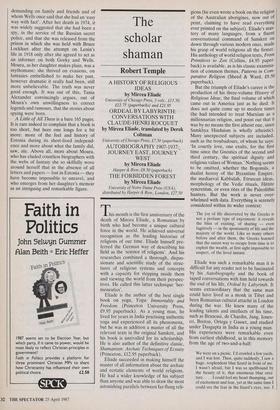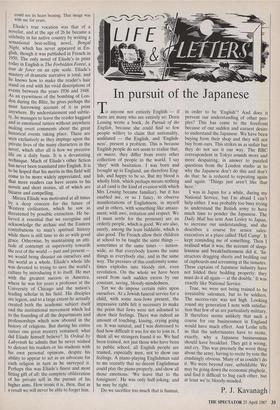The scholar shaman
Robert Temple
A HISTORY OF RELIGIOUS IDEAS by Mircea Eliade
University of Chicago Press, 3 vols., £13.50, £12.75 (paperbacks) and £21.95
ORDEAL BY LABYRINTH: CONVERSATIONS WITH CLAUDE-HENRI ROCQUET by Mircea Eliade, translated by Derek Coltman
University of Chicago Press, £7.50 (paperback)
AUTOBIOGRAPHY 1907-1937:, JOURNEY EAST, JOURNEY WEST by Mircea Eliade
Harper & Row, £8.50 (paperback)
THE FORBIDDEN FOREST by Mircea Eliade
University of Noire Dame Press (USA), distributed by Harper & Row, London, £27.50
This month is the first anniversary of the death of Mircea Eliade, a Romanian by birth who had become a unique cultural force in the world. He achieved universal recognition as the leading historian of religions of our time. Eliade himself pre- ferred the German way of describing his field as the 'science of religions'. And his researches combined a thorough, dispas- sionate and scientific study of the struc- tures of religious systems and concepts with a capacity for stepping inside them and viewing the world from their perspec- tives. He called this latter technique 'her- meneutics'.
Eliade is the author of the best single book on yoga, Yoga: Immortality and Freedom (Princeton University Press, £9.95 paperback). As a young man, he lived for years in India practising authentic yoga and experienced all its phenomena, but he was in addition a master of all the relevant texts in the original Sanskrit, and his book is unrivalled for its scholarship. He is also author of the definitive classic, Shamanism: Archaic Techniques of Ecstasy (Princeton, £12.95 paperback).
Eliade succeeded in making himself the master of all information about the archaic and ecstatic elements of world religions. He had a wider knowledge of his subject than anyone and was able to draw the most astonishing parallels between far-flung reli- gions (he even wrote a book on the religion of the Australian aborigines, now out of print, claiming to have read everything ever printed on the subject). Eliade's mas- tery of many languages, from a fluent conversational command of Sanskrit on down through various modern ones, made his grasp of world religions all the firmer. His anthology of world religion texts, From Primitives to Zen (Collins, £4.95 paper- back) is available, as is his classic examina- tion of common themes, Patterns in Com- parative Religion (Sheed & Ward, £9.50 paperback). But the triumph of Eliade's career is the production of his three-volume History of Religious Ideas, the final volume of which came out in America just as he died. It does not quite come up to modern times (he had intended to treat Marxism as a millennarian religion, and point out that it was by no means the first atheist one, since Samkhya Hinduism is wholly atheistic). Many unexpected subjects are included, such as the troubadours, of whom he says: `In courtly love, one exalts, for the first time since the Gnostics of the second and third century, the spiritual dignity and religious values of Woman.' Nothing seems to be omitted, whether the Bogomils, a dualist heresy of the Byzantine Empire, the mediaeval Kabbalah, Etruscan ideas, morphology of the Vedic rituals, Hittite syncretism, or even rites of the Paleolithic hunters. But the work is never over- whelmed with data. Everything is serenely considered within its wider context:
The joy of life discovered by the Greeks is not a profane type of enjoyment: it reveals the bliss of existing, of sharing — even fugitively — in the spontaneity of life and the majesty of the world. Like so many others before and after them, the Greeks learned that the surest way to escape from time is to exploit the wealth, at first sight impossible to suspect, of the lived instant.
Eliade was such a remarkable man it is difficult for any reader not to be fascinated by his Autobiography and the book of taped conversations with him held towards the end of his life, Ordeal by Labyrinth. It seems extraordinary that the same man could have lived as a monk in Tibet and been Romanian cultural attache in London during the war. He knew many of the leading talents and intellects of his time, such as Brancusi, de Chardin, Jung, Iones- co, Breton, Ortega y Gasset, and studied under Dasgupta in India as a young man. His experiences were remarkable even from earliest childhood, as in this memory from the age of two-and-a-half: We were on a picnic. I'd crawled a few yards, and I was lost. Then, quite suddenly, I saw a huge, resplendent blue lizard in front of me. I wasn't afraid, but I was so spellbound by the beauty of it, that enormous blue crea- ture. . . . I could feel my heart thumping, out of excitement and fear, yet at the same time I could see the fear in the lizard's eyes, too. I
could see its heart beating. That image was with me for years.
Eliade's true vocation was that of a novelist, and at the age of 26 he became a celebrity in his native country by writing a sensational best-selling novel, Bengal Night, which has never appeared in En- glish, though it was published in French in 1950. The only novel of Eliade's in print today in English is The Forbidden Forest, a tour de force on an epic scale. Eliade's mastery of dramatic narrative is total, and he knows how to make the reader's hair stand on end with his vivid descriptions of events between the years 1936 and 1948. As an eyewitness of the bombing of Lon- don during the Blitz, he gives perhaps the most harrowing account of it in print anywhere. By understatement and subtle- ty, he manages to leave the reader haggard and in emotional tatters without anywhere making overt comments about the great historical events taking place. These are seen exclusively as they impinge upon the private lives of the many characters in the novel, which after all is how we perceive life on a daily basis. It is a devastating technique. Much of Eliade's other fiction has never been translated into English. It is to be hoped that his merits in this field will come to be more widely appreciated, and that more readers can have access to his novels and short stories, all of which are bizarre and compelling. Mircea Eliade was motivated at all times by a deep concern for the future of Western civilisation, which he saw as threatened by possible extinction. He be- lieved it essential that we recognise and acknowledge the archaic and the Eastern contributions to man's spiritual history while there is still time to do so with good grace. Otherwise, by maintaining an atti- tude of contempt or superiority towards the rest of the world — past and present we would bring disaster on ourselves and the world as a whole. Eliade's whole life was devoted to trying to save the world's culture by introducing it to itself. He met with the greatest success in America, where he was for years a professor at the University of Chicago and the nation's leading scholar in his field. His disciples are legion, and to a large extent he actually created both the academic subject itself and the institutional movement which led to the founding of all the departments and professorships which now abound in the history of religions. But during his entire career one great mystery remained: what did Eliade himself believe? In Ordeal by Labyrinth he admits that he never wished to distract his readers or his students with his own personal opinions, despite his ability to appear to act as an advocate for each religion in turn as he surveyed it. Perhaps this was Eliade's finest and most fitting gift of all: the complete obliteration of his private self in the pursuit of his higher aims. How ironic it is, then, that as a result we will never be able to forget him.



































































 Previous page
Previous page